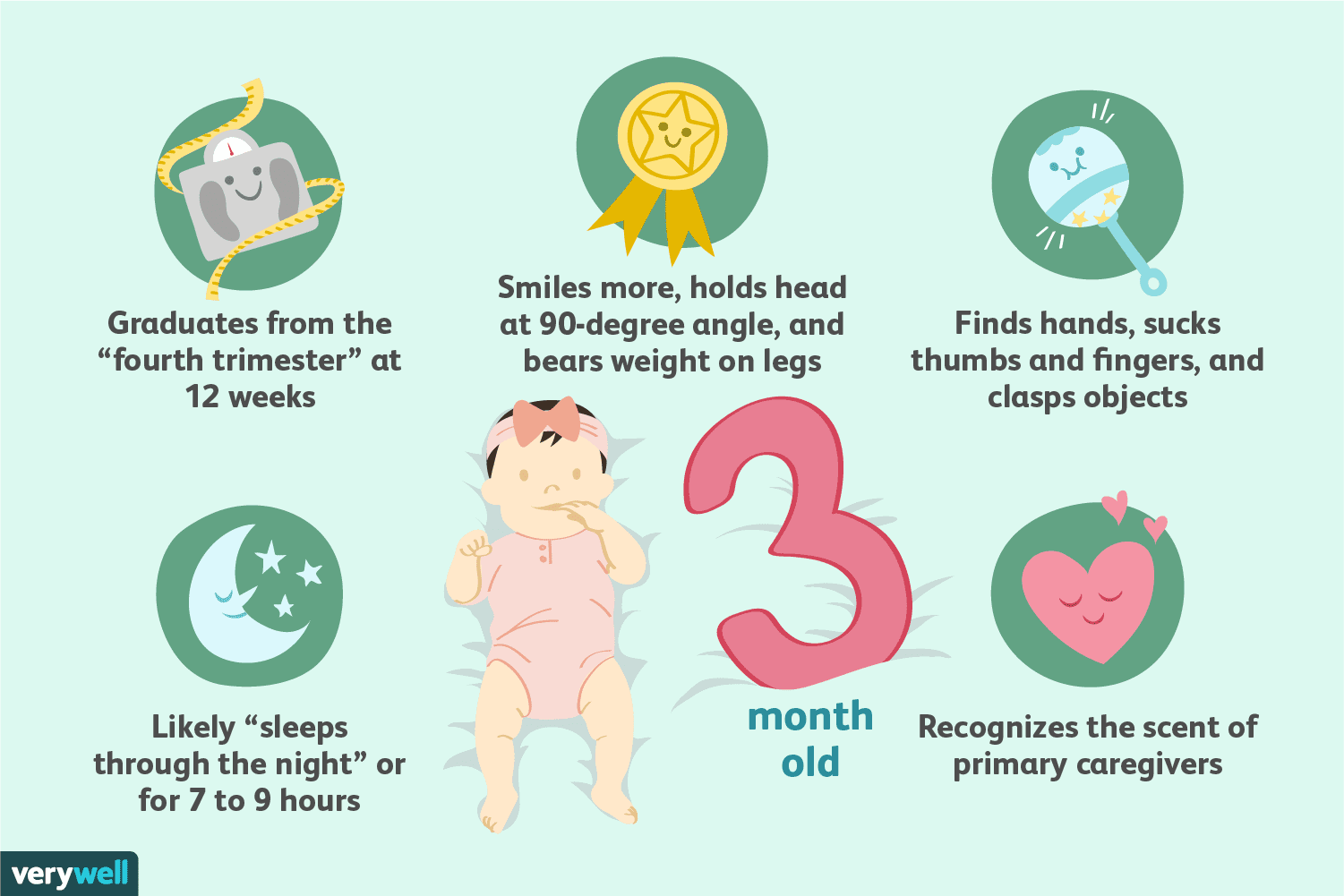
At 3 months old, your baby has already come a long way from being a newborn. They are now more alert and responsive to the world around them. As a parent, it is important to know what to expect in terms of your baby’s physical, cognitive, and social development at this stage.
Table of Contents
Physical Development

By the end of the third month, your baby’s physical development will have progressed significantly. They will have gained some weight and grown in length. By now, they should be able to hold their head up for a few seconds without support and may even be able to roll over from tummy to back.
Your baby will also be able to move their arms and legs more freely, and may even be able to grasp an object in their hand. They will have better control over their movements and may start to reach for objects that are within their reach.
Cognitive Development

At 3 months old, your baby’s cognitive development is also progressing. They will be able to recognize familiar faces and voices and may even smile in response. They will be more alert and responsive to their environment, and may enjoy looking at colorful objects and listening to sounds.
Your baby will also be more aware of their own body and may start to explore their hands and feet. They may also start to babble and make cooing sounds, which are the first steps towards language development.
Social Development

At 3 months old, your baby’s social development will also be progressing. They will be more responsive to people around them and may start to smile and coo when interacting with others. They will also be able to recognize familiar faces and voices, and may show a preference for certain people.
Your baby will also be able to respond to touch and may enjoy being cuddled and held. They may also start to show signs of separation anxiety when away from their caregivers.
Feeding

At 3 months old, your baby will still be getting most of their nutrition from breast milk or formula. They may be eating more at each feeding and may go longer between feedings, but they should still be eating every 2-3 hours.
It is important to watch for signs that your baby is hungry or full, and to follow their cues when feeding. Your baby should be gaining weight steadily and have plenty of wet diapers.
Sleeping

At 3 months old, your baby will still be sleeping a lot, but may be starting to develop more of a sleep routine. They may start to sleep for longer stretches at night and take shorter naps during the day.
It is important to establish a consistent sleep routine with your baby, including a regular bedtime and nap schedule. This will help them develop healthy sleep habits and make it easier for you to get the rest you need as well.
Playtime

At 3 months old, your baby will be starting to enjoy playtime more. They will enjoy looking at colorful toys and may even start to reach for and grasp them. They may also enjoy listening to music and watching colorful mobiles.
It is important to provide your baby with age-appropriate toys and activities that stimulate their senses and encourage their development. You can also use playtime as an opportunity to bond with your baby and strengthen your relationship.
Conclusion
At 3 months old, your baby’s development is progressing rapidly. They are becoming more alert and responsive to their environment, and may even be starting to reach developmental milestones like rolling over and grasping objects. It is important to provide your baby with a stimulating and nurturing environment, as well as regular feedings and sleep routines. By doing so, you can help support your baby’s healthy growth and development.
Frequently Asked Questions
What should my 3 month old baby be doing?
By 3 months old, your baby should be able to hold their head up for a few seconds without support, roll over from tummy to back, and grasp an object in their hand. They will also be more alert and responsive to their environment, and may start to babble and make cooing sounds.
How often should my 3 month old baby be feeding?
At 3 months old, your baby should still be eating every 2-3 hours, either through breast milk or formula. It is important to watch for signs that your baby is hungry or full, and to follow their cues when feeding.
How much should my 3 month old baby be sleeping?
At 3 months old, your baby will still be sleeping a lot, but may be starting to develop more of a sleep routine. They may start to sleep for longer stretches at night and take shorter naps during the day.
What kind of toys are appropriate for my 3 month old baby?
At 3 months old, your baby will enjoy looking at colorful toys and may even start to reach for and grasp them. You can provide your baby with age-appropriate toys that stimulate their senses and encourage their development, such as soft toys, rattles, and mobiles.
What can I do to help support my 3 month old baby’s development?
To help support your baby’s development, you can provide them with a stimulating and nurturing environment, regular feedings and sleep routines, and age-appropriate toys and activities. You can also use playtime as an opportunity to bond with your baby and strengthen your relationship.
